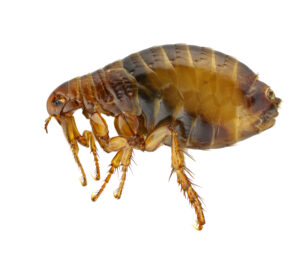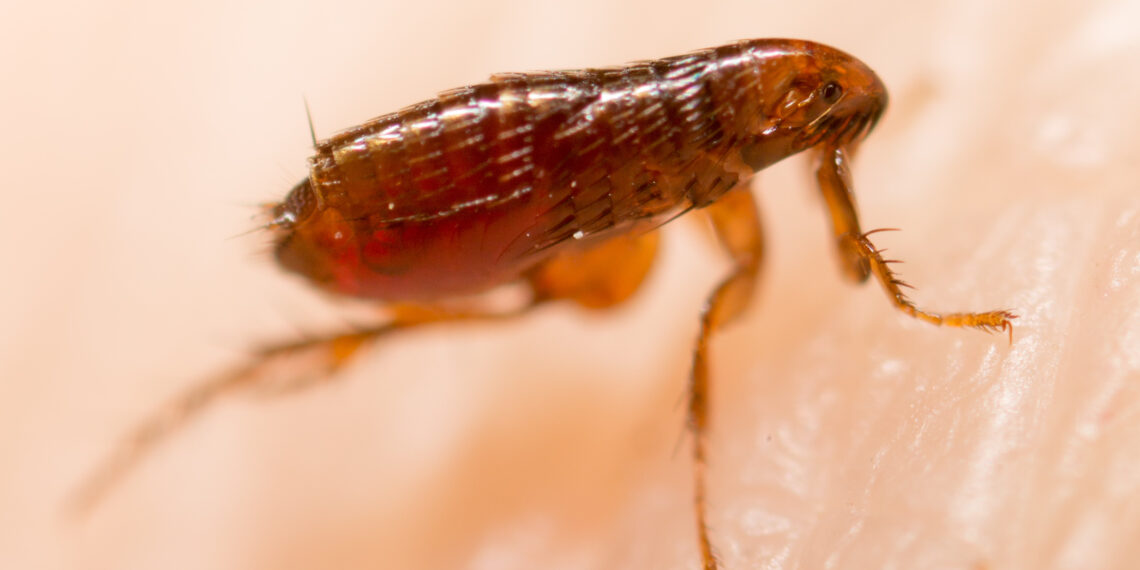Most people love animals. In fact, there are over 29 million pets in Australia. Dogs are the most common choice of domestic pet, followed closely by cats. Unfortunately, our adored pets can also be a target for fleas. These pesky insects can make their way into your home and garden by hitching a ride on your dog or cat.
Did you know that you can have fleas in your home even if you don’t own a pet? It’s actually possible for them to enter your home all by themselves and lay their flea eggs.
Once the larvae develop and the fleas hatch, they will start searching for a host to live on and fleas aren’t fussy about who they bite. They will attack your whole family from your much-loved dog to your favourite aunt.
Flea Types Found in Australia
Flea is the common name for the order Siphonaptera, which includes 2,500 species.
Fleas found in Australia include the cat flea, (Ctenocephalides felis), the dog flea, (Ctenocephalides canis) and the human flea, (Pulex irritans). The cat flea is the most common flea found in Australia and despite its name they mostly infect dogs and humans.

What are fleas?
Fleas are very small, flat-bodied insects that feed on blood. Adult fleas can range in colour from light brown to a dark reddish-brown and can measure anywhere between 2 – 8 mm. They will exist on warm-blooded animals as hosts and can also be found in carpets, bedding, curtains, in between floorboards and in pet baskets or beds.
Fleas love to live on the family pet and if your four-legged friend has fleas then it’s likely that you are vulnerable to a flea invasion of your entire home, furniture and garden.
How long does a flea live?
There are four forms during the flea life cycle – egg, larva, pupae and adult. This cycle can occur as quickly as within two weeks! An adult flea can live between several weeks to several months.
Fleas rely on blood for nutrition and female fleas can lay up to four eggs after each feed of blood, sometimes as many as 50 eggs per day. The female lays the eggs and they drop off into carpet and beddings before hatching.
The flea life cycle is affected by the environment, with temperature and humidity playing a big part. Our warmer climate of South East Queensland is perfect for a faster flea life cycle, making it particularly important to eradicate fleas as soon as possible.
How do dogs and cats get fleas?
Fleas can jump! They have powerful rear legs that enable them to leap up to 18cm vertically and 33cm horizontally.
Fleas don’t fly, they jump from one place to another. This makes it easy for them to get onto a dog, cat or even a human.
How to get rid of fleas in your house
So, you’ve noticed a problem. Perhaps your cat is scratching furiously, or maybe you’ve seen a few insects jumping around your dog’s bedding. Now is the best time to end this problem, before it gets any worse. The last thing you need is a flea infestation.
Make sure you carefully check your pet. Fleas can be easy to miss on first inspection. Tell-tale signs include excessive scratching, or you find ‘flea dirt’ in areas where your pet has been resting.
The most important thing is to make sure you are treating the whole problem. One simple flea treatment of your dog or cat won’t get rid of fleas for good. You need to treat your home and garden space as well. It’s also essential to develop a treatment routine, for your animals, home and yard.
Treat all pets
- Don’t presume that it’s only the pet you’ve seen scratching that has fleas.
- Treat all of your pets with a reliable flea treatment.
- Follow the treatment instructions to protect your pet all year round.
How to get rid of flea eggs
- Wash your pets bedding in hot soapy water to ensure you kill the eggs.
- Place the bedding in direct sunlight to dry.
- Continue to wash the bedding once per week to prevent flea reinfestation occurring.
How to get fleas out of carpet
It’s safe to say that fleas won’t be contained to one area of your home. It’s likely that you will find fleas in your carpet, in your bedroom and perhaps even fleas in your bed!
- Make sure you use a powerful vacuum.
- If possible, use a steam cleaner. The combination of high heat and soap will stop the flea life cycle.
- Use a home flea treatment. Choose one that will kill eggs, larvae, pupae as well as the adult fleas.
- Engage a professional pest control technician to ensure you get the job done.
How to get rid of fleas in your yard
- Remove all rubbish from around the house
- Mow your lawn – fleas love long grass
- Spread cedar chips in your garden, especially where your dogs will be. Fleas hate the smell.
Warning signs that you have a flea infestation
- Seeing multiple dot like insects on your pets’ fur
- Your pets are scratching, licking or excessively biting fur
- You notice fleas jumping on curtains, carpet or furniture
What causes a flea infestation?
Knowing why you have a flea infestation is key in helping prevent future problems. It also ensures that the flea invasion isn’t a sign of a bigger problem. Your family pet isn’t the only furry animal that can bring fleas into your home. It could be rodents or other wildlife pests which present you with a different pest problem.
Fleas flourish in warm climates making our South East Queensland area a prime environment for flea breeding. Finding out you have a flea infestation can be distressing, however if you take appropriate actions it is possible to get on top of this problem.
What other threats are caused by fleas?
Fleas can spread diseases and parasites and can also cause an allergic reaction. If a flea infection goes unnoticed it is possible for your pet to develop tapeworm.
Want to get rid of fleas for good?
As you can see, it can take several methods and hours of your time to rid your home of fleas. It’s most important to remember to treat the whole problem. Once you establish a regular system of cleaning and treatment you will find the problem should get easier to manage each time.
When to call a professional exterminator?
All treatments should be handled carefully. If you’re unsure about which product to use or how much to apply, it might be best to call a professional. Or if you feel that your regular routine isn’t getting you the desired results of total flea eradication, engage a pest control expert.
A professional exterminator will give you peace of mind that you will be rid of your flea problem in the most effective and safe way possible. They’ll have local area familiarity as well as expert treatment knowledge. Based on their experience they will also make recommendations on what can be done to avoid or minimise further flea infestations.





